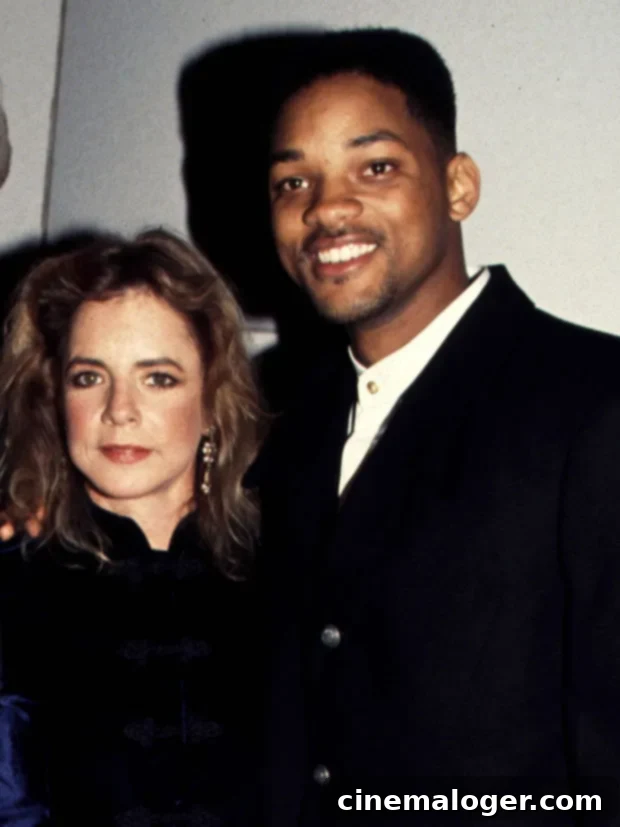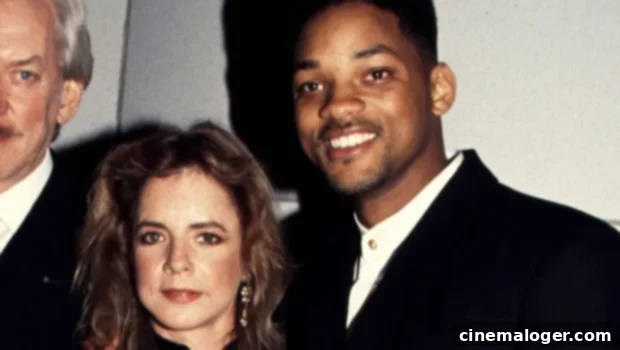Will Smith’s Candid Memoir: The Emotional Toll of Method Acting and Falling for Stockard Channing During His First Marriage
In a revealing passage from his highly anticipated new memoir, Will, Hollywood superstar Will Smith has offered an unprecedented look into the challenges of his early career and personal life. The A-lister candidly shared details about an intense period during the filming of the 1993 drama, Six Degrees of Separation, where his deep immersion into method acting led to him developing profound feelings for his co-star, Stockard Channing. This emotional journey unfolded while Smith was in the nascent stages of his first marriage to Sheree Zampino, shedding light on the complex interplay between professional demands and personal boundaries in the demanding world of show business.
Smith’s memoir, which has garnered significant attention for its raw honesty, delves into the psychological depths he explored for his role as Paul Poitier in the critically acclaimed film. It was an experience that not only shaped his understanding of acting but also tested the foundations of his then-young marriage. “Sheree and I were in the first few months of our marriage with a brand-new baby and for Sheree, I can imagine that this experience was unsettling to say the least,” the 53-year-old actor penned, in an excerpt published by PEOPLE. His words paint a vivid picture of the internal conflict and external pressure he faced, highlighting the immense personal sacrifices often made in pursuit of artistic authenticity.

The role of Paul Poitier required Smith to embody a character far removed from his public persona at the time. Poitier was a cunning yet vulnerable young man who infiltrates the lives of a wealthy New York couple, played by Stockard Channing and Donald Sutherland, by pretending to be the son of Sidney Poitier. The intensity of the character and the commitment to method acting meant that Smith’s personal identity became deeply intertwined with that of his on-screen counterpart. “She’d married a guy named Will Smith and now she was living with a guy named Paul Poitier,” Smith continued in his memoir, reflecting on his wife’s perspective. This immersion was so profound that it led to an unexpected and emotionally charged outcome for the rising star.
“And to make matters worse, during shooting I fell in love with Stockard Channing,” Smith confessed. This revelation underscores the profound psychological impact method acting can have, where the boundaries between actor and character, and between on-screen emotions and real-life feelings, can blur. The confession reveals a deeply human struggle, a testament to the power of performance and the vulnerability of the human heart when pushed to its limits for the sake of art. After the cameras stopped rolling and the film wrapped, the lingering emotions proved difficult to shake. “After the film wrapped, Sheree and Trey and I moved back to L.A. Our marriage was off to a rocky start. I found myself desperately yearning to see and speak to Stockard.” This raw admission highlights the lasting emotional residue of such an immersive experience, and the profound challenge it posed to his fledgling marriage.
This isn’t the first time Will Smith has touched upon the intense nature of his experience with Six Degrees of Separation. In a 2015 interview with Esquire, he openly discussed the “dangers” of method acting, a technique that encourages actors to fully inhabit their characters, sometimes to the detriment of their personal lives. “With Six Degrees of Separation, I got a taste early of the dangers of going too far for a character,” he told the outlet at the time. “My character was in love with Stockard Channing’s character. And I actually fell in love with Stockard Channing.” His candid reflection then, much like now, emphasized the fine line actors tread when delving into the emotional core of their roles, particularly when those roles demand an intimate connection with a co-star.
Smith elaborated further on the aftermath of the filming during that earlier interview, providing more insight into the internal struggle he faced. “So the movie was over and I went home, and I was dying to see Stockard. I was like, ‘Oh no! What have I done?’ That was my last experience with Method acting, where you’re reprogramming your mind. You’re actually playing around with your psychology. You teach yourself to like things and to dislike things.” This powerful statement illustrates the profound psychological shift an actor undergoes with method acting, and why Smith ultimately decided to distance himself from such an intensive approach. The experience, while artistically enriching, proved too personally disruptive, prompting him to reconsider the boundaries he would set for his craft in the future.
The impact of Smith’s 2015 revelation was met with a gracious and understanding response from Stockard Channing herself. Speaking to Page Six, the esteemed actress, best known for her roles in Grease and The West Wing, shared her reaction to his confession. She admitted she was “flattered” by Will’s candidness, offering a glimpse into the respectful and warm professional relationship they shared during filming. “That’s a wonderful thing … I adored him from the first time I laid eyes on him because I thought he was genuinely sweet. I felt very protective of him, because it was his first big job. It’s amazing for me to hear that he felt that way, I’m delighted.” Channing’s comments underscore the mutual admiration and the unique bond that often forms between actors working closely on a project, especially one as emotionally charged as Six Degrees of Separation. Her perspective offers a gentle counterpoint to Smith’s intense internal struggle, highlighting the supportive atmosphere that can exist on a set even amidst personal turmoil for one of its stars.
The enduring fascination with celebrity memoirs stems from the unique opportunity they offer to peer behind the curtain of fame and understand the human experiences of those in the public eye. Will Smith’s memoir, which officially went on sale on November 9th, serves as a powerful example of this. It’s not just a recounting of career triumphs but an exploration of personal growth, mistakes, and the difficult lessons learned along the way. His openness about falling in love with a co-star while married, a narrative often sensationalized in tabloids, is instead presented as a genuine internal conflict arising from a rigorous acting technique and the vulnerable nature of human emotions.
This particular revelation reignites discussions about method acting and its often-debated efficacy and ethical implications. While some actors swear by it for delivering unparalleled performances, others, like Smith, have recognized its potential for personal disruption. The blurring of lines between reality and fiction, character and self, can be a potent artistic tool but also a precarious tightrope walk for an actor’s mental and emotional well-being. Smith’s journey through this experience undoubtedly shaped his approach to acting in subsequent iconic roles, where he continued to deliver powerful performances without necessarily sacrificing his personal equilibrium in the same manner.
Will Smith’s career trajectory since Six Degrees of Separation has been nothing short of extraordinary, marked by numerous blockbuster films, Academy Award nominations, and a consistent presence at the pinnacle of Hollywood. His ability to navigate the complexities of fame, while evolving personally and professionally, is part of what makes his memoir so compelling. The story of his early, intense connection with Stockard Channing, framed within the context of his first marriage, provides a vital piece of the puzzle in understanding the multifaceted life of one of the world’s most recognizable stars. It reminds us that behind every character, every scene, and every public persona, lies a deeply human story, rich with complexities, vulnerabilities, and transformative experiences.
Ultimately, Will Smith’s memoir serves as a poignant reminder that even the most celebrated individuals grapple with universal human emotions, professional pressures, and the constant negotiation between their public and private selves. His honest recollection of falling for Stockard Channing during a pivotal early role not only adds depth to his personal narrative but also contributes to a broader understanding of the unique challenges inherent in the craft of acting and the sacrifices often demanded by a life in the spotlight.
